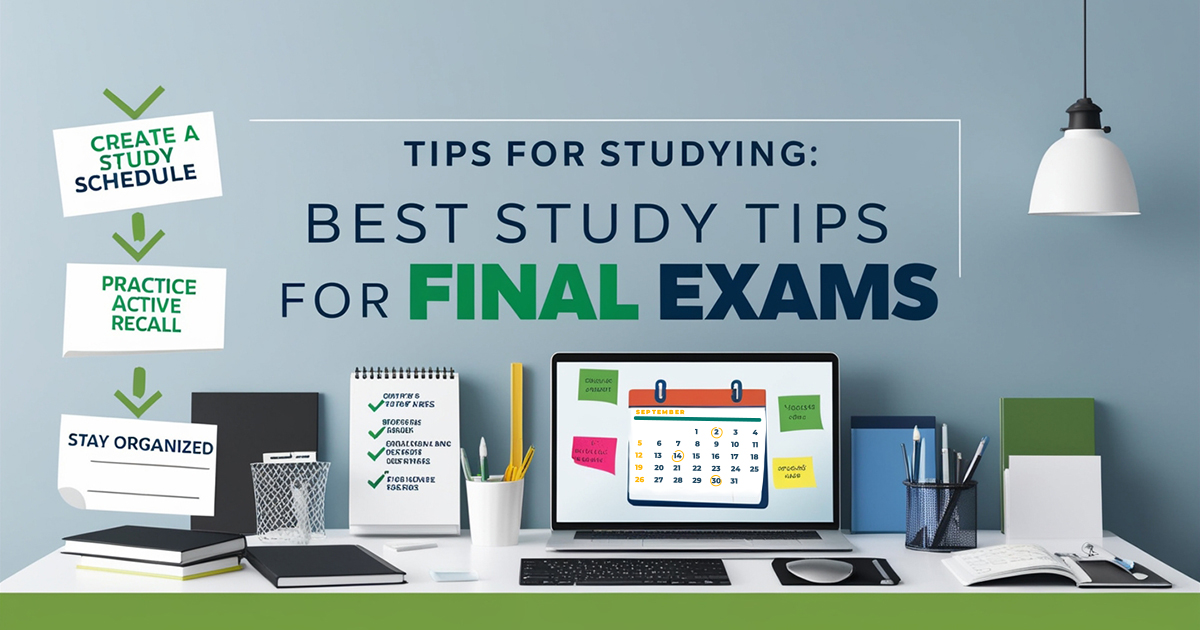Blog Detail


Tips for Studying: Best Study Tips for Final Exams
24-10-2024

Final exams are different from regular tests. These exams cover material from the entire semester, and students often have to study all the topics within a short period of time. Final exams serve as a critical evaluation of a student's overall understanding of the semester's content. Although finals can create anxiety for even the most confident students, they don't need to take over one's life or disrupt sleep during the final weeks of the term.
With a well-planned strategy, finals can shift from being a major burden to an opportunity. By incorporating effective study tips for exams, students can manage their time efficiently, reduce anxiety, and enhance their focus, ultimately resulting in higher performance on exams. To help students achieve better grades with less stress, here are some study tips for exams that make the exam period more manageable.
Pay Attention to Classes
Attending all class sessions and taking clear, organised notes is crucial for effective review later. For online classes, ensuring a stable internet connection and the right equipment, like headphones and a second monitor, can help focus. Students should actively ask questions and follow up with professors to clarify any doubts.
Group Study
Joining study groups can help students review materials and develop strong study habits. Collaborating with classmates boosts confidence and reinforces knowledge. It's important to ensure that discussions stay focused on relevant topics and that all group members contribute to the session’s goals.
Create Flashcards
Flashcards are useful for condensing key concepts, definitions, and facts. Students can quiz themselves or use digital apps to enhance their review sessions. This technique allows for repeated, active recall of information, which is critical for retention, especially before final exams.
Find a Good Study Spot
The ideal study environment varies for everyone. Some students may prefer the quiet of a library, while others enjoy the buzz of a café. Experimenting with different settings, whether indoors or outdoors, can help students find the most productive space for studying without distractions.
Read and Review Regularly
Regularly reviewing class material after each session helps combat forgetting. Breaking chapters into sections and summarising key points can increase comprehension. Revisiting difficult areas ensures that students gradually build understanding without cramming closer to exams.
Stay Organised
Keeping a well-organised study plan with clear goals and objectives can reduce stress. Using planners to track deadlines and assignments helps students prioritise their tasks. Referring to the class syllabus and marking important dates helps in keeping up with the course schedule.
Visualise the Material
Visual learners can benefit from converting notes into diagrams, charts, or mind maps. Highlighting important points and summarising material visually makes it easier to understand complex concepts. This method can be particularly useful for subjects requiring detailed analysis.
Take Regular Breaks
Taking short breaks between study sessions can improve focus and productivity. Using techniques like the Pomodoro method, which includes 25-minute study intervals followed by brief breaks, keeps the mind fresh. Incorporating light physical activity during breaks enhances concentration.
Stay Health
Proper nutrition, regular exercise, and adequate sleep are essential for peak mental performance. Eating healthy food and maintaining a consistent sleep schedule helps students stay energised and focused. Balancing study time with self-care is crucial for long-term academic success.
Wrapping Up
Final exams require comprehensive understanding and effective preparation to achieve desired results. By prioritising tasks, organising study time, and incorporating self-care, students can navigate their exam periods with confidence. Ultimately, adopting these study tips for exams will not only lead to better academic performance but also contribute to a healthier and more productive study experience. Embracing these study tips for exams will empower the students to approach their exams as opportunities for growth and achievement rather than as overwhelming challenges.